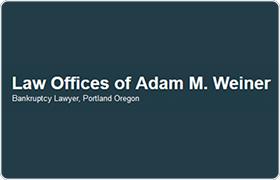Gaston Bankruptcy & Debt Lawyer, Oregon
Sponsored Law Firm
-
 x
x

Click For More Info:
-
Law Offices of Adam M. Weiner
8624 SE 13th Ave Portland, OR 97202» view mapBankruptcy & Debt Premier Bankruptcy Attorney
Life doesn’t always have to be hard. Consult with a bankruptcy attorney who looks out for your best interests. Call today to begin the process for a fresh financial start.
503-719-5123
Karen Laree Manske
Landlord-Tenant, Business & Trade, Contract, Commercial Bankruptcy
Status: In Good Standing *Status is reviewed annually. For latest information visit here Licensed: 30 Years
Matthew David Mills
DUI-DWI, Bankruptcy, Family Law
Status: In Good Standing *Status is reviewed annually. For latest information visit here Licensed: 16 Years
Michael Lewis Finch
Business, Corporate, Credit & Debt, Personal Injury
Status: In Good Standing *Status is reviewed annually. For latest information visit here
Mark A Sherman
Estate, Bankruptcy, Bankruptcy & Debt, Bankruptcy & Debt, Collection
Status: In Good Standing *Status is reviewed annually. For latest information visit here Licensed: 51 Years
James E Zwaanstra
Family Law, Business & Trade, Commercial Bankruptcy, Bankruptcy
Status: In Good Standing *Status is reviewed annually. For latest information visit here Licensed: 28 Years
Rachel Negra
Bankruptcy & Debt
Status: In Good Standing *Status is reviewed annually. For latest information visit here Licensed: 23 Years
 Adam M. Weiner Portland, OR
Adam M. Weiner Portland, OR Practice AreasExpertise
Practice AreasExpertise